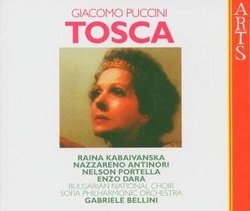| All Artists: Giacomo Puccini, Gabriele Bellini, Sofia Philharmonic Orchestra, Borislav Peev, Enzo Dara, Nazzareno Antinori, Nelson Portella, Raina Kabaivanska, Roumen Doikov, Stoyan Balabanov Title: Puccini: Tosca Members Wishing: 0 Total Copies: 0 Label: Arts Music Release Date: 7/9/1996 Genre: Classical Style: Opera & Classical Vocal Number of Discs: 2 SwapaCD Credits: 2 UPCs: 600554715827, 036244715820 |
Search - Giacomo Puccini, Gabriele Bellini, Sofia Philharmonic Orchestra :: Puccini: Tosca
 | Giacomo Puccini, Gabriele Bellini, Sofia Philharmonic Orchestra Puccini: Tosca Genre: Classical
|
Larger Image |
CD Details |
CD ReviewsKabaivanska Makes A Radiant Tosca Rudy Avila | Lennox, Ca United States | 09/09/2005 (5 out of 5 stars) "Bulgarian soprano Raina Kabaivanska is best known for Tosca, having sung the role more thany other soprano in countless performances. It was her signature role. Callas, despite her own success, sang it only a few times and was not even fond of the role finding it the hardest role to work with. Calla's interpretation on disc (the EMI 1950's recording) is still considered the supreme version by most hardcore operaphiles and even her later Met apperances in the mid sixties with Tito Gobbi in concert-form/scenes as Act 2 were still considered superior to later portrayals. But Raina makes Tosca a radiant romantic figure with dramatic acting and lush vocal flow. She appeared in a 1975 film opposite Placido Domingo and Sherill Milnes. Sadly, there is no soundtrack recording to that film, which is really a top-notch and thrilling performance. Here though we have the same Raina with perhaps even better and younger voice and singing Tosca in a way that not even Callas could have made possible.
I like to think that sopranos have each made a kind of mark on Tosca. Leontyne Price made her earthy, primal but regal, Mirella Freni made her a victim pushed to murder and suicide in a more classic sense without making her appear to strong, Birgit Nilsson made Tosca a Wagner heroine, Katia Ricciarelli is as Italianate in her portrayal as was her predecessor diva Renata Tebaldi, Kiri Te Kenawa weakened the character too much and made her a musical entity without true gumption, Zinka Milanov made her as Russian Romantic heroine as the later Galina Vishnevskaya did. Raina Kabaivanska makes Tosca as authentic as she can be. Her thunderous and gleaming voice is perfect for the role. Having seen the 1975 film with Domingo and Milnes, I can see her hand movements and facial expressions in my mind as I hear her singing in this recording. She makes Tosca a passive-aggressive woman, something which very few sopranos do. Mirella Freni does this as well. She has no "attack" in her voice the way Callas had or the way even Birgit Nilsson had. She's paying homage to the days where Toscas like Tebaldi sang the role full of unabashed lyrical flow. Yet, her singing is underlined with raw emotion. In Act 1, she expresses her religiosity by attending Church and her secular love for the artist and political idealist Mario Cavaradossi. Love is easy to portray when you're a soprano but for Tosca, her character goes up and down in a roller coaster ride of different emotions through the opera. Before Act 1 even concludes, she has already manifested her insecurity and unreasonable jealousy. The lusty and wicked Scarpia deceives Tosca into thinking Mario has a lover the Countess of Atavanti who left behind her fan while fleeing from intrusion in the Church. The fan actually belongs to the sister of the political refugee Angelotti whom Mario is hiding. Driven by self-motivation to get Mario executed and to have his way with Tosca, he plays on Tosca's jealousy to extract his scheme. The scheme comes into light in Act 2 where he tortures Mario in an attempt to get the truth about Angelotti's hiding place. Tosca is stuck in his terrible wrath and plan for revenge. Mario is taken away to be executed. Time is running out. Only Tosca can save him- she must offer her body to Scarpia for one night. In Act 2, within the luxury of Scarpia's Palace, Tosca emotes her feelings of horror, loathing, pain, suffering, rage and fear. Many interpretors theorize that Tosca is partly falling for Scarpia (this I don't buy at all since Scarpia is the Devil himself not even moved by her passionate prayer to God asking why she was suffering when she had lived a good life). Tosca, fed up from all the pain she has endured for one evening, finally shows us she's not a weak heroine at all and is resolved to have her Mario and do away with the threat of an enemy- she stabs Scarpia mercilessly, goading him to die and choke in his blood. This scene Raina does very well. However, if she did on stage what she did in the film, she leaves out an integral part of this infamous scene. After she violently murders the opera villain, she retreats to her religiosity and honors the man for whom "all Rome trembled" by laying a crucifix on his chest and lighting candles in a funereal fashion. She is certain she will pay for her crime one way or another (On Judgement Day) but for now she is content to run away with Mario. In the last Act, Scarpia gets his revenge from beyond the grave and has Mario executed after all- it was supposed to be a mock execution but to Tosca's surprise and despair, he is really killed. There is no way to end this hell but leap off the Castel San Angelo to her death. "O Scarpia we shall meet before God" - Raina sings this with great passion. It's a fine recording with a fine soprano in the role." |

 Track Listings (11) - Disc #1
Track Listings (11) - Disc #1